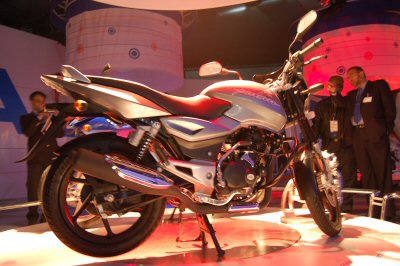Tata, Bajaj, M&M, Ashok Leyland will work on hydrogen fuel vehicles
It seems it’s not just politics that makes strange bedfellows. The quest for cheaper, environment-friendly fuel, too, does.
Four Indian automobile giants — Tata Motors, Bajaj Auto, Mahindra & Mahindra and Ashok Leyland — have joined hands under the aegis of Society of Indian Automobile Manufacturers (SIAM).
Their agenda? To find out how hydrogen can be used as an alternative fuel.
As a first step, the companies will experiment with a blend of hydrogen and CNG, called hithane.
Says K K Gandhi, executive director (technical), SIAM: “These four companies and the Indian Oil Corporation will conduct a pilot study on optimisation of hithane by blending 10-20% of hydrogen and CNG.”
The use of hydrogen as an alternative fuel will help reduce dependence on foreign oil. Besides, it will also reduce NOX (nitrous oxide) emissions and help achieve better fuel efficiency.
In a hydrogen engine, electricity generated from solar power is used to split water into hydrogen and oxygen. Oxygen is released into the atmosphere, while hydrogen is liquefied and stored at a very low temperature (-253 °C). During internal combustion, the hydrogen combines with oxygen. The resulting energy powers the vehicle, while the hydrogen is returned to the environment as water.
However, several issues have to be addressed before viable hydrogen engines can be developed indigenously.
Explains Arun Jaura, senior V-P (R&D and product development), M&M: “The use of hydrogen in vehicles poses several challenges such as its availability, distribution, on-board storage and safety. The SIAM project is the first step towards looking for a viable use of hydrogen in automobiles in the Indian context.”
M&M has already made a beginning with hydrogen — by showcasing a concept vehicle called HY-Alpha Champion in this year’s Auto Expo. HY-Alpha is a sub-one tonne category three-wheeler, which runs on compressed hydrogen gas so that there is zero carbon dioxide and carbon monoxide emission and a much cleaner tailpipe emission. Besides, it provides up to 25% better fuel efficiency compared with traditional fuels.
Bajaj Auto already possesses an entire fleet of CNG vehicles - three-wheeler passenger carriers as well as goods carriers. Pradeep Shrivastava, V-P (Engineering), says the company is interested in any alternative that offers fuels with lower emissions of NOX (nitrous oxide). “Whatever is needed to modify engines for trial purposes under this project will be done by Bajaj Auto,” he says.
Though all this is new in India, there has been attempts to develop hydrogen fuel cells and hydrogen engines in the United States and some parts of Europe.
Yet, even in their home countries, such technologies are still being confined largely to institutional transport fleets.
However, with German luxury car maker BMW having just declared its intention to roll in a vehicle which will run on liquid hydrogen, things sure look bright for the green brigade.
Source:-
www.dnaindia.com 














